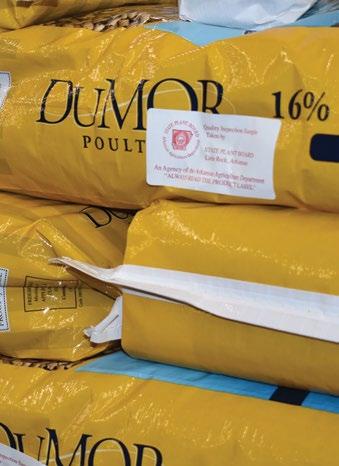
3 minute read
Plants, Pets, and Pellets
from Arkansas Grown
Plant Industries Division Inspectors Are Protecting Your Pets and Your Food
What do the gypsy moth, a bag of dog food, a crepe myrtle tree, and cottonseed all have in common?
Advertisement
Each seemingly unconnected item, and dozens more, fall under the purview of Arkansas Department of Agriculture Plant Industries Division inspectors. To hear 31-year veteran David Fort tell it, there’s not much related to agricultural consumer protection that state inspectors don’t touch.
“We do a little bit of everything,” Fort said. “The biggest part of it is a consumer protection function.”
For instance:
Inspectors monitor traps in late fall and December for the invasive gypsy moth, often imported into the state on Christmas trees from the upper Midwest. The gypsy moth is a dangerous pest that can be lethal to deciduous trees.
Fort and his fellow inspectors verify nutrition labels on pet food.
The Plant Board was established more than a century ago to monitor stock in Arkansas’s plant and landscaping nurseries for diseases. This year, Fort said inspectors are trying to stave off a rash of disease in crepe myrtles, called crepe myrtle scales.
Inspectors evaluate cottonseed and all other agricultural seeds to ensure the germination rate is appropriate and that the state’s farmers are getting the type of seed they expect.
“I think these are all very important functions of the Arkansas Department of Agriculture,” Fort said. “Can you imagine a farmer going in to buy seed and it only germinates at a rate of 10%? They won’t harvest a crop. It’s a very important function to make sure farmers get what they pay for.”
Fort is based in the southern part of the state, where he oversees several inspectors and also takes on an inspector role himself. There are about 30 Plant Industries Division inspectors across Arkansas, who along with chemists and lab technicians work tirelessly on behalf of agricultural producers and consumers. The Arkansas Department of Agriculture has a seed lab, a chemical lab, and a germination lab at its Little Rock offices.
The labs certify seed that is to be sold in Arkansas, and it tests samples of pet and other animal food to ensure label guarantees are accurate. Fort used the example of a hunting dog – it’s extremely important to a consumer for the protein levels in certain highend pet foods to be the same as on the label.
Whether feed or seed, if at any time the product tested in the lab doesn’t match the information on the label, the Arkansas Department of Agriculture issues a “stop sale” order to the retailer and manufacturer, prohibiting the sale of mislabeled items to consumers.
When not collecting seed or feed, Fort said inspectors spend a substantial amount of time in the field investigating what they refer to as “misuse of pesticides” complaints. Those complaints arise from other farmers, landowners, or others concerned about whether pesticides applied in nearby fields may affect their crops, produce, or vegetation.
The misuse of pesticides investigations “have been a very big deal since 2016. It seems like I’ve worked investigations all summer long,” Fort said.
A specific herbicide, dicamba, has been contentious in Arkansas for the last several years. Drift from dicamba application has been blamed for damage to crops, trees, and vegetation.
When tasked with a pesticide or herbicide investigation, Fort said inspectors document findings with photography and residue samples. Farmers who apply pesticides or herbicides are asked to follow all label instructions for application. He noted that the “label is the law,” and failing to meet the label requirements could result in penalties or sanctions.
Fort said Arkansas has consistently instituted new programs to keep up with changing agricultural trends and to meet challenges as they relate to invasive species. Not all states have had as rigorous and thorough an inspection program as Arkansas, and those states are worse for it, he added.

“We’ve had other states who did away with their feed and fertilizer programs years ago, and they figured out that they’ve got to have feed inspectors and seed inspectors,” he said.










